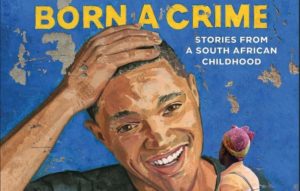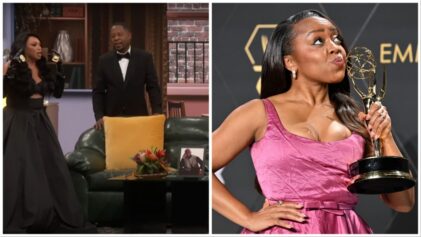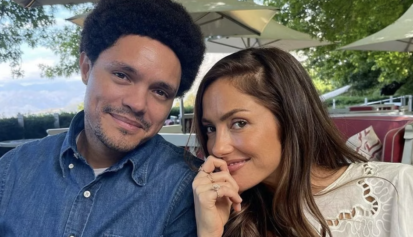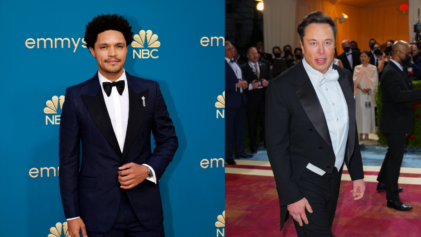
The leadership of our School of Global Journalism and Communication at Morgan State University has encouraged that professors like myself find ways this semester to incorporate into our work the new book Born a Crime: Stories from a South African Childhood by Trevor Noah. Noah is the South African-born, biracial, Colored comedian and host of Comedy Central’s The Daily Show. Copies have been distributed to students and faculty alike and I anticipate there being a flurry of engagement for courses in media studies as Noah’s book has plenty to offer.
Immediately we can start with critiques of false balance and Western politicized notions of objectivity, both of which were in play during Noah’s recent extended exchange with the aggressive right wing commentator Tomi Lahren. Many know of Noah’s nightly television work and it appears many more know him now after the straw woman performed her role in enhancing Noah’s credibility and right in time to coincide nicely with his book’s launch. What liberal aspirant to the throne of legitimacy wouldn’t want her as an interlocutor? Even in the silly film Pop Star Conner Friel (Andy Samberg) made sure his entourage consisted of a “perspective adjuster” whose sole function was to make the star look better by comparison. Muhammad Ali’s legend wasn’t born by his fights with Henry Cooper and Brian London. It were the fights with Liston, Frazier, Foreman and the federal government that told us he was the greatest.
We can also as a class ask, what is happening semiotically with the book’s cover? It read to me from the first like the perfect symbolic display of Noah’s entire political function as celebrity. Noah’s beige face, askew, askance even – especially – with that grin, hand touching his head, painted on a tattered township wall, imposing, top-down upon a faceless Black African woman, almost saying, in an aloof, twisted version of the Old Spice commercial, “aww-shucks, look at me. Now look at you. Now look at me again. Now look at you. And back to me. I’ve made it and you can to? Never mind that. Look at me!” Its reminiscent of any billboard falsely advertising an exclusive lifestyle of which most onlookers can only dream.
Again, before even opening the book. What is being conveyed by the title itself? Born a Crime. Its certainly provocative. The tendency will be to read this as Noah emphasizing the insanity of apartheid and its racial codes. But when considered next to the content and approach of the book itself, the title seems more and more to me to be about claiming a legitimacy that works to protect against critique. Yes, Noah was indeed born a crime by the laws written in South Africa against miscegenation. But the phrase is used here almost as a bludgeon that seeks to elevate Noah to a position of authority, authenticating approaches to covered topics that reaffirm norms rather than challenge or threaten them. Remember how Charlamagne practically gushed over Noah’s racial experience and expertise on The Breakfast Club? As if Charlamagne doesn’t come from a country settled by invading Europeans at the expense of genocide, forced removal and enslavement which created still-existing racial categories, boundaries and unequal (and devolving) material lived experiences. But where some comparative analysis might be of value, Noah’s work reads as an attempt to create distinction for the sake of enhancing his brand’s value.
And then to the book itself. Born A Crime is a personal memoir that isn’t particularly riveting or deeply analytical regarding the history and lingering effects of apartheid. It can be compared negatively to Frank Wilderson’s far more powerful, investigative and damning Incognegro: A Memoir of Exile and Apartheid. Among the many differences is the distinction that Noah’s is not a movement biography. Noah was barely six when Nelson Mandela was released from prison and he apparently fully adopts the uncritical dominant narrative that this signified an end to apartheid as opposed to the end of armed struggle, the leadership of Chris Hani or the Freedom Charter.
The chapters consisting of Noah’s selected stories open with short historical overviews, quick highlights of apartheid and light back-grounding. Not a lot of substance, nothing drawn from a perspective of (radical) political struggle. It is just enough to draw a reader in to almost gentle renditions of a nightmare. This is, after all, a top five publisher’s product. Random House is looking for big distribution numbers and best seller’s lists, the kind that require a particular broad approach that attracts white affluence and praise. Noah’s book is obviously and understandably meant to supplement, not scuttle, his day job of hosting a nightly commercial television show that caters primarily to those same younger, whiter, more affluent and liberal audiences. They will tolerate and even enjoy Noah’s stories about apartheid because rather than be reminded of a dark (pun intended) past, Noah speaks mostly to the brightness (again, pun intended) of a post-apartheid future.
We get vignettes of Noah’s experience as a “mixed-race” Colored. Little of Noah’s white father whose disappearance feels almost like an out for white readers forced to face the racial violence of apartheid. After the initial description of a broader system, white involvement is less emphasized instead replaced with the more comforting focus on Black male pathology – via Abel, Noah’s stepfather. There is also the interesting but yet still comforting focus on Noah’s Black African mother – specifically her Christianity. Noah presents it as an unquestioned positive with nothing really suggesting it too resulted from Western imperialism and violence.
In fact, perhaps our class can look at this issue critically, how violence is welcomed in the mainstream to the extent that it is intra-communal and never directed at power. This is part of the recipe for success in the U.S. for sure where white producers, directors and writers of Black pathology receive McArthur Genius Awards and Oscars. Violence in Noah’s book is mostly relegated to incidents among the Black or Colored majorities and since the memoir avoids apartheid’s political struggles as a subject we don’t read of violence in the context of revolutionary armed struggle (in which Mandela had himself been involved) – the Umkhonto we Sizwe, MK or “Spear of the Nation” – nor do we read of violence meted out by the state upon fallen heroes like Steve Biko.
Mirroring the approach in Born a Crime is Noah’s recently published New York Times opinion piece. He uses the authority given him by his pop-celebrity to create South African apartheid as the authenticating back drop to his own very liberal and sophomoric approaches to problems of race and class. This authority allows him to use the preferred narrative of South African history and Mandela’s release to tell us here in the U.S. that “moderation and compromise” are not “selling-out.” But then what does this say to the radical traditions left unmentioned by Noah, traditions still alive in the work of the Economic Freedom Fighters or Black Land First movements? Never mind that. Aww shucks, look at me!
Noah’s advice from Born a Crime is that we get over our past and the ramifications set in motion during enslavement, apartheid, colonialism, Jim/Jane Crow, etc. Never mind Noah says “move on…If you think too much about the ass-kicking your mom gave you, or the ass-kicking that life gave you, you’ll stop pushing the boundaries and breaking the rules. It’s better to take it, spend some time crying, then wake up the next day and move on.”
This all will be great for in-class discussions of Stuart Hall’s dominant, oppositional or negotiated narrative readings! We can diagnose why this narrative dominates main-stream culture as opposed to serious alternative views of how to struggle against societal oppression.
Perhaps our class can ask that question and attempt to find its answer in Noam Chomsky and Ed Herman’s Propaganda Model in their book Manufacturing Consent that gives a critiquing of elite media bias. For instance, both the New York Times and The Guardian published their praise for Noah’s book and I wonder if it helped that Times’ readers, for instance, won’t find much in Noah’s memoir reminding them of the long history of U.S. support for that country’s white minority regime or how their Black Consciousness Movement reflected and inspired alike the Black Power Movement here. Nothing from Noah will remind them that the U.S. could have learned plenty prior to ’08 about the failure of Black leadership imposed on largely unchanged structures culminating in actual declines in material livelihood of Black people. Nor will the Guardian’s readers be reminded much of England’s role in conquering and then maintaining colonial and apartheid rule for centuries.
Where Noah almost threatens himself is in his nearly powerful assertion that for Africans imperial invaders like Cecil Rhodes and King Leopold are considered worse than Adolph Hitler. This is a dangerous thread which cannot be followed to its logical conclusion in mainstream commercial media. He has to leave this short and couched in a story about a childhood friend because to follow this logic, would mean concluding that the West itself – not just the outcast Nazis of a German “past” – is in opposition to African liberation and sovereignty.
Then there is this interesting interplay carried on by Noah in his performance of identity, being African, yet both bi-racial and Colored and yet also acceptably Black in the context of the U.S. Noah, a child of a Black African Xhosa woman and a white Swiss father, is largely read as Black in a North American context, and so is legitimate enough to perform his role as a distiller of race for whites while persisting their established ideologies around race (white superiority, Black inferiority, etc.). Noah’s approach, exemplified in Born a Crime, is better understood in the context described by Ralina Joseph as a “boom” in “Mixed-race memoirs [which] are a recent phenomena produced for and by the Loving generation, the population of multiracial people born after the 1967 Supreme Court decision legalizing interracial marriage, Loving v. the State of Virginia…” A movement which emerged largely “[s]ince the early 1990s with the birth of an active ‘Multiracial Movement’ and a flourishing of scholarship on multiraciality…” And, as Joseph and Jared Sexton, among others, have explained, this “Multiracial Movement” in the U.S. is one largely created and led by white women whose children by Black men they did not want to be so directly connected to Black communities, struggles and histories. That these women also represent a core segment of Noah’s and Comedy Central’s target audience might also suggest why his particular approach works.
Noah attempts to craft a very distinct and authoritative (multi)racial personae, one perfectly suited to his position as an elite commercial media product. One that allows him to be seen by American commercial media audiences as an authority on race precisely because of his particular brand of anti-Black racial ideology reaffirmation. It works because he is, but yet isn’t, Black. It’s a kind of “connected distance” that helps authenticate while mollifying. He is special but not so much as to really challenge convention. As has already been noted by Tomi Obaro, Noah’s rise to prominence in the U.S. coincided with his routine willingness to use appearances in this country to denigrate Black people:
“That special wasn’t even the first time Noah has made jokes at black Americans’ expense. When he was tapped as the first African comedian to ever perform on The Tonight Show with Jay Leno in 2012, he used the historic moment as an opportunity to marvel with melodramatic wonder at black American names: “It’s almost like they lose their minds with the Scrabble pieces while giving birth.” The jokes were embarrassing enough that, three years later in a 2015 GQ interview, Noah apologized (kind of): “I hadn’t fully understood the African-American experience. I hadn’t read the books; I hadn’t met the people; I hadn’t traveled the country,” he assured writer Zach Baron.”
That makes the reading of how Noah got his name in Born a Crime so interesting. His Black African mother named him Trevor, “a name with no meaning whatsoever in South Africa, no precedent in my family. Its not even a Biblical name. Its just a name. My mother wanted a child beholden to no fate. She wanted me to be free to go anywhere, do anything, be anyone.” “Beholden to no fate” can just as easily be read as “committed to no struggle, no politics, no people” with the freedom to go anywhere, assume any role, be, as Noah has also said, “anyone,” a “chameleon.”
In some ways this liminality by naming reads, which is consistent with the prevailing content of Noah’s performance that often feels fluid and searching, like the young man who applied his multilingualism as self-defense to where, “…it became a tool that served me my whole life… I became a chameleon. My color didn’t change but I could change your perception of my color.” But this shape-shifting self-defense for survival in the streets or to find success in commercial media is not nearly as original as Noah seems to want us to believe – or needs us to create that sense of distinction and authority. However, perception management – – is an essential component to public relations (read: psychological warfare, propaganda, advertising, marketing).
Dr. Jared A. Ball is a father and husband. After that he is an Associate Professor in the School of Global Journalism and Communication at Morgan State University and curates the multimedia site of Emancipatory Journalism at imixwhatilike.org.


